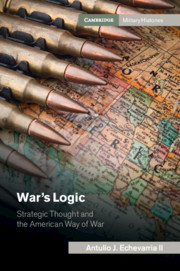Book contents
- War’s Logic
- Cambridge Military Histories
- War’s Logic
- Copyright page
- Dedication
- Contents
- Acknowledgments
- Introduction
- Part I First Principles and Modern War
- Part II The Revolt of the Strategy Intellectuals
- 3 Bernard Brodie, Robert Osgood, and Limited War
- 4 Thomas Schelling and War as Bargaining and Coercion
- 5 Herman Kahn and Escalation
- Part III The Counterrevolution of the Military Intellectuals
- Part IV The Insurrection of the Operational Artists
- Conclusion
- Notes
- Select Bibliography
- Index
5 - Herman Kahn and Escalation
from Part II - The Revolt of the Strategy Intellectuals
Published online by Cambridge University Press: 05 February 2021
- War’s Logic
- Cambridge Military Histories
- War’s Logic
- Copyright page
- Dedication
- Contents
- Acknowledgments
- Introduction
- Part I First Principles and Modern War
- Part II The Revolt of the Strategy Intellectuals
- 3 Bernard Brodie, Robert Osgood, and Limited War
- 4 Thomas Schelling and War as Bargaining and Coercion
- 5 Herman Kahn and Escalation
- Part III The Counterrevolution of the Military Intellectuals
- Part IV The Insurrection of the Operational Artists
- Conclusion
- Notes
- Select Bibliography
- Index
Summary
Chapter 5 analyzes the thinking of Herman Kahn, who dared to think the unthinkable. It describes his "America," which again was that of the golden age of the middle class, but which also overlapped with the sense of malaise that plagued the 1970s. Like the limited war theorists, Kahn agreed military instincts needed to be curbed, and he attempted to counter uncertainty by arguing, largely in vain, that escalation itself was also a bargaining process with systematic waystations or steps embedded along its path. This chapter discusses his model of war’s nature, which, like those of Brodie, Osgood, and Schelling, priviledged war’s political dimension, though he gave policy more agency than did they.
- Type
- Chapter
- Information
- War's LogicStrategic Thought and the American Way of War, pp. 93 - 110Publisher: Cambridge University PressPrint publication year: 2021

